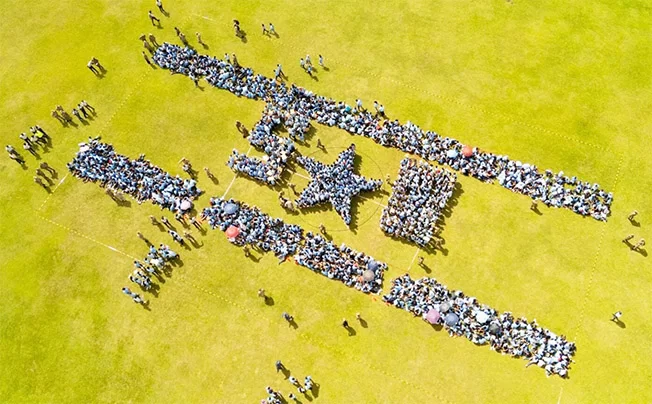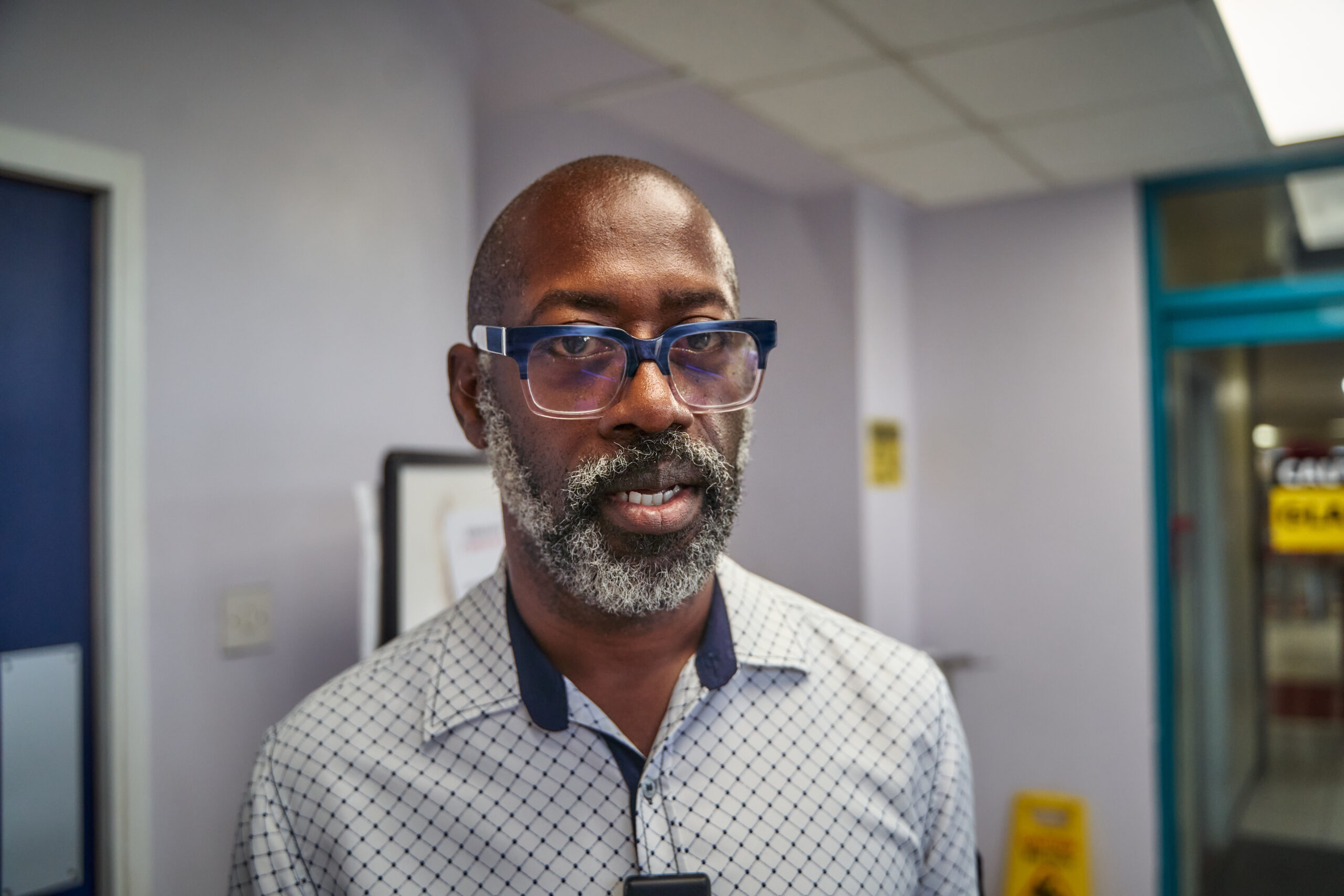The Srefidensi Committee has acknowledged significant organizational lapses during the preparations for the upcoming gymnastics parade, pledging to implement immediate improvements to ensure a safe and enjoyable experience for all participants. The Commission for the 50th Anniversary of Constitutional Independence has issued a sincere apology to students, teachers, and parents for the inconveniences experienced during the rehearsal sessions. ‘We recognize the shortcomings in our planning and take full responsibility to address them swiftly and effectively. Our aim is to restore confidence and enthusiasm among all children participating in these special sporting preparations,’ the commission stated. To enhance the upcoming rehearsal days, the committee has increased the number of first aid personnel and supervisors. Schools will also provide additional staff to bolster student safety and care. The Police Training Center has made toilets available for the second rehearsal day, and from November 1st, eight to ten portable toilets will be strategically placed to ensure adequate sanitation facilities throughout the event. Furthermore, water distribution has been reorganized, with each student receiving a personal water bottle for better hydration. The commission has also urged parents to ensure their children wear hats or head coverings for sun protection and to pack extra snacks, drinks, and a spare water bottle in a small backpack. ‘These small measures can significantly impact the children’s well-being,’ the committee emphasized. ‘We are working diligently to normalize the situation and hope to embody the spirit of Srefidensi through unity, trust, and pride in our youth.’
博客
-

Column: Realiteit en waarheid zijn niet populair bij de VHP
The VHP, once a beacon of honest governance, reform, and innovation, appears to have lost its moral compass entirely. Over the five years it held power, the party failed to prioritize the public interest, instead functioning as a network of influential figures, friends, families, and confidants who shielded one another from accountability. Since its electoral defeat on May 25, this image has only grown clearer. The VHP is no longer a national people’s party but a collection of individuals hiding under the same orange umbrella. Principles have been overshadowed by personalities, particularly those who thrive on applause and affirmation. While the party projects an image of internal harmony, a closer look reveals division, bruised egos, and a fear of challenging leadership. The cracks are now impossible to ignore. What stands out most is the party’s opportunistic opposition tactics since its defeat. Issues it could have resolved with its previous majority are now loudly condemned, while problems it once oversaw are disingenuously blamed on others. As society yearns for mature political self-reflection, the VHP prefers to plant political bombs—not to build, but to destroy. Chairman Chan Santokhi seems trapped in his own reality, dismissing the defeat with comforting falsehoods, as if the electorate misunderstood his achievements rather than the party itself. Outside the party’s walls, this belief has long evaporated. The lack of honesty was evident this week when spokesperson Dew Sharman questioned the integrity of Starnieuws, denying a report about the departure of senior board member Sidik Moertabat, who had confirmed his exit in an interview. Instead of acknowledging the facts, Sharman chose denial and discredited the media—a telling sign of the party’s character. This is not an isolated incident. Whenever internal issues arise, the VHP avoids political reality, addressing it opportunistically, as seen in its political appointments and dismissals of loyalists. This behavior reflects arrogance—a mix of power, self-deception, and fear of the truth. A party that claims to uphold values should know better. Democracy demands not compliance but courage—the courage to face the truth, even when it’s painful.
-

News : Zapping…
Haiti has officially transitioned to a state of normalcy following the passage of Hurricane Melissa. On November 30, 2025, the Haitian Hydrometeorological Unit (UHM), in collaboration with the General Directorate of Civil Protection (DGPC) and the National Risk and Disaster Management Plan, announced the lifting of the weather alert. This decision, marking a return to green-level conditions, signals the end of the hurricane’s influence on the country’s weather. Minister of National Education Antoine Augustin confirmed the resumption of school activities starting October 31, 2025. Meanwhile, the aftermath of the hurricane continues to unfold. The provisional death toll has risen to 30, with 20 injured and 20 missing, according to Civil Protection. In response, Minister of Economy and Finance Alfred Metellus activated the emergency fund to support recovery efforts, ensuring resources are available for Civil Protection, local communities, and relevant ministries. In other news, a police operation in Tabarre resulted in the deaths of four members of the ‘Kraze Baryè’ gang, led by Vitelhomme Innocent. On a brighter note, Haitian author Yanick Lahens was awarded the 2025 Grand Prize for Fiction by the French Academy for her novel ‘Passagères de nuit’ (Night Passengers), receiving widespread acclaim from the French Embassy in Haiti and the National Library of Haiti. Additionally, Haiti’s U-17 Grenadiers have secured support from 13 sponsors as they prepare for their first match against Egypt in the Qatar 2025 World Cup on November 4.
-
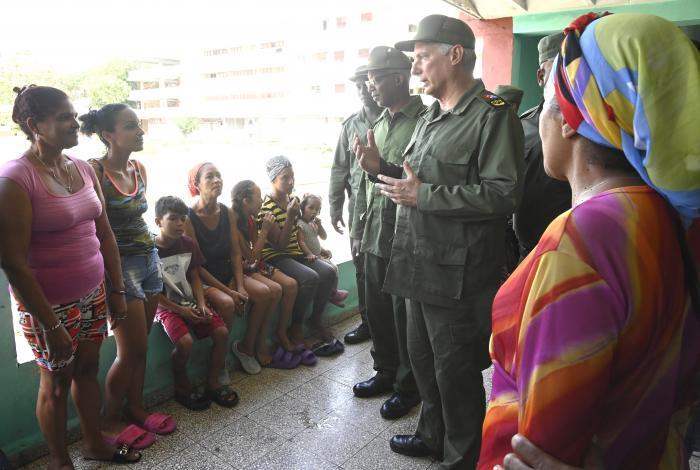
The humanity of a revolution stands up
Cuban President Miguel Díaz-Canel Bermúdez has initiated a comprehensive tour of Holguín, one of the regions most severely impacted by Hurricane Melissa, the most powerful hurricane in Cuba’s recorded meteorological history. Accompanied by key government officials, including Roberto Morales Ojeda, head of the Political-Ideological Work Body, and several deputy prime ministers, Díaz-Canel assessed the extensive damage and coordinated recovery efforts. The hurricane caused widespread destruction, including flooding, uprooted trees, and submerged villages, displacing thousands of residents. During his visit to the José Martí Pre-University Vocational Institute of Exact Sciences (IPVCE), which has sheltered 321 evacuees, the president emphasized the importance of prioritizing life and ensuring the safe return of displaced families to their homes. He also highlighted the resilience of the community and the effective response of local authorities. The president’s itinerary included visits to critical infrastructure, such as the Providencia photovoltaic solar park and the Vladimir Ilich Lenin General Hospital, both of which withstood the hurricane’s impact. Díaz-Canel underscored the need for organized and responsible recovery efforts, particularly in agriculture and housing, and commended the collaborative work of various government bodies. The provincial leadership, led by Joel Queipo Ruiz, reported significant challenges, including crop losses and damaged communications, but reaffirmed their commitment to safeguarding lives and accelerating recovery.
-
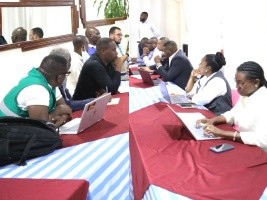
iciHaiti – Post-Melissa : Health sector review
In the aftermath of Hurricane Melissa, which brought devastating winds and torrential rains to Haiti, Dr. Bertrand Sinal, the Minister of Public Health, convened a critical meeting with key health sector partners. The session focused on evaluating the hurricane’s impact and strategizing a response to ensure the continuity of essential health services across the nation. The assessment highlighted minimal damage to health facilities in most departments, with only minor incidents reported at Saint-Antoine Hospital in Jérémie and Immaculée Conception Hospital in Port-de-Paix. Additionally, a flash flood affected the courtyard of the South Departmental Hospital in Les Cayes. Dr. Sinal praised the dedication of health workers and the support from international organizations like PAHO/WHO and UNICEF. He emphasized the need for enhanced epidemiological surveillance and vigilance against potential health risks, particularly waterborne diseases, in the hurricane’s aftermath.
-
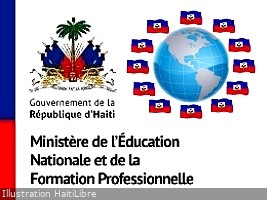
Education : Patriotic appeal to the Haitian scientific community in the diaspora
In a bold move to revitalize Haiti’s education system, Augustin Antoine, the Minister of National Education and Vocational Training (MENFP), has issued a heartfelt appeal to the Haitian scientific community abroad. The minister’s call seeks to transform the nation’s ‘brain drain’ into a ‘return of knowledge,’ fostering a renewed connection between Haitian researchers at home and those in the diaspora. This initiative aims to integrate research into Haiti’s public policies, economy, governance, and culture, ultimately building a ‘Haiti of knowledge.’
Despite ongoing efforts, Haiti’s university system continues to grapple with significant challenges, including insufficient research, funding shortages, lack of scientific supervision, and outdated infrastructure. The recently established Public Universities in the Regions (UPRs) are particularly in need of technical support, mentorship, international partnerships, and sustainable resources to strengthen their operations and contribute to national development.
Minister Antoine envisions the Haitian scientific diaspora playing a pivotal role in this transformation, not only as intellectual collaborators but also as strategic supporters of the National Education Fund (FNE), a cornerstone of the country’s public education policy. The Ministry plans to create a structured program of scientific and academic cooperation, enabling Haitian researchers abroad to contribute in three key areas: training teachers and school administrators, supporting the Departmental Directorates of Education (DDEs), and aiding the UPRs in research, innovation, and institutional development.
This initiative represents more than just a resource-gathering effort; it is a call to unite the Haitian national community around a shared vision of knowledge, excellence, and progress. Minister Antoine’s appeal emphasizes the importance of reclaiming the identity of the Haitian scientific diaspora as the ‘voice, strength, and light’ of a resilient Haiti that continues to believe in its potential and refuses to surrender to adversity.
-
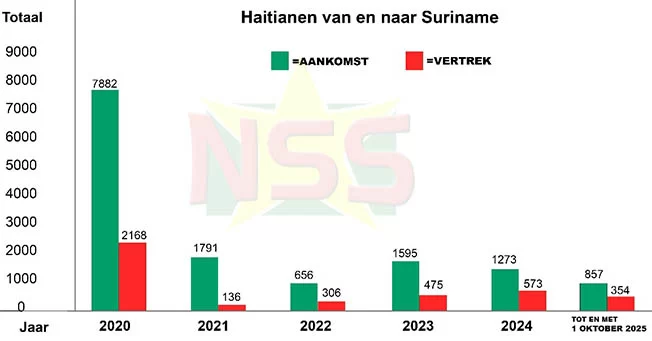
Onderzoek: Cijfers tonen grote instroom Haïtianen, maar weinig werkvergunningen
Since 2020, nearly 15,000 Haitians have arrived in Suriname, yet only 108 have applied for work permits by the end of last year, according to data from Suriname’s Immigration Service and Labor Directorate. Over 4,000 Haitians have since left the country, leaving approximately 10,000 undocumented workers or those who crossed borders unnoticed to continue their journey. The reasons for this significant influx remain unclear, and the exact number of Haitians registered with the Foreigners Department of the Ministry of Justice and Police is unknown. Initial promises to release this data were abruptly halted, and requests for information from Minister Harish Monorath were unsuccessful. Former Foreign Minister Albert Ramdin stated in May that there are currently no flights from Haiti and the situation is not alarming, though he acknowledged pressure to admit Haitians. Charter flights operated by Saya Tours & Travel via Fly Allways were suspended due to rumors of human trafficking. Ramdin emphasized that Suriname’s open migration policy made it a transit point, but measures like visa requirements have since been implemented to mitigate the issue. Suriname has maintained its top ranking in the U.S. Trafficking in Persons Report for 2024 and 2025, and Ramdin stressed the importance of maintaining this status. Haitians reportedly pay between $2,700 to $4,000 per person for travel to Suriname, a significant sum in Haiti. Saya Tours denied allegations of profiteering, claiming the flights were primarily to assist the Haitian community. The Haitian consulate in Paramaribo was dismantled in August 2024 over suspected involvement in human trafficking, though staff denied any wrongdoing. Fly Allways director Amichand Jhauw declined to disclose charter flight costs, but sources estimate profits of $116,000 per flight. Saya refuted these claims, citing high administrative costs and political sponsorship as factors in obtaining flight permissions. Despite the suspension of special charters, 857 Haitians entered Suriname in 2025, raising questions about migration enforcement.
-

Arajet assists Dominican government in evacuating citizens from Jamaica after Hurricane Melissa
In the wake of Hurricane Melissa’s devastating impact on Jamaica, the Dominican Government has partnered with Arajet Airlines to organize complimentary humanitarian flights aimed at repatriating Dominican citizens stranded by the storm. The initiative underscores a swift and coordinated response to the crisis, prioritizing the safety and well-being of affected individuals. The first flight is set to depart from Kingston on Saturday, November 1, at 11:00 a.m., arriving in Santo Domingo by 1:30 p.m. A second flight is scheduled for Tuesday, ensuring continued support for those in need. Additionally, passengers with existing travel plans to or from Jamaica are permitted to reschedule their trips within a 15-day window without incurring extra charges. To facilitate a smooth and transparent process, the Dominican Embassy in Jamaica will meticulously review each repatriation request. Emergency contact lines have been activated by the Embassy and its Consular Section to provide immediate assistance. Both the Dominican Government and Arajet have reaffirmed their dedication to safeguarding Dominicans abroad, highlighting their collaborative efforts to deliver urgent aid to hurricane victims.
